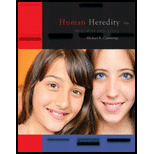
Bruce Ames and his colleagues have pointed out that although detailed toxicological analysis has been conducted on synthetic chemicals, almost no information is available about the mutagenic or carcinogenic effects of the toxins produced by plants as a natural defense against
- a. With the introduction of new foods into the U.S. diet over the last 200 years (mangoes, kiwi fruit, tomatoes, and so forth), has there been enough time for humans to develop resistance to the mutagenic effects of the toxins present in those foods?
- b. The natural pesticides present in plants constitute more than 99% of the toxins we eat. Should diet planning, especially for vegetarians, take into account the doses of toxins present in the diet?
Trending nowThis is a popular solution!

Chapter 11 Solutions
Human Heredity: Principles and Issues (MindTap Course List)
- Briefly discuss the reason why CoQ10 has been formulated into skin care products and used as food supplements.arrow_forwardWhat is the role of Agrobacterium tumefaciens in the production of transgenic plants?a. Genes from A. tumefaciens are inserted into plant DNA to give the plant different traits.b. Transgenic plants have been given resistance to the pest A. tumefaciens.c. A. tumefaciens is used as a vector to move genes into plant cells.d. Plant genes are incorporated into the genome of Agrobacterium tumefaciensarrow_forwardWhat are the possible effects and changes on the Michaelis-Menten equation that can result from competitive, noncompetitive, mixed noncompetitive and uncompetitive inhibitors?arrow_forward
- 09. What is “EMLA”? Give its purpose?arrow_forwardWhich of the following pathways is likely to NOT be directly affected by the antimetabolite drug methotrexate? a. Production of purine deoxyribonucleotides b. Production of purine ribonucleotides c. Production of thymidylate d. Production of pyrimidine ribonucleotidesarrow_forwardWhen present on the leaves of plants, the bacterium Pseudomonas syringae can promote frost damage to plants. Mutant strains, lacking the “ice” gene, have been applied to plants to try and protect the plants from wild-type P. syringae-induced frost. Assume that I am telling the truth that wild-type P. syringae nucleates ice formation at -2 °C, and provide an explanation as to why application of this altered (mutant) bacterium to plants might be a beneficial agricultural strategy in areas where morning lows occasionally dip down to 28-30 °F.arrow_forward
- this is an example of biotechnology: In order to increase the yield of oil from canola, research focused on ways to reduce competition from competitor weed plants. Weeds can be controlled by spraying with a herbicide that interferes with biological processes, like amino acid anabolic reactions, in the plant cells. A mutant of canola that is resistant to herbicides is sometimes grown in fields that are sprayed with the herbicide. The majority of canola in Canada, though, is genetically modified to be resistant to herbicides. also use the link: https://youtu.be/VS3kcwgIwm0 Question: Evaluating Biotechnologies in Food Systems As we practice being able to describe choices in Biology you will use this consolidation task to organize details about the advantages and disadvantages of biotechnologies. In an ideal world, all solutions to improving our food system would have no negative consequences. But issues in Biology involve the interaction of many different factors and changes in one…arrow_forwardGive a schematic diagram of how we can nonpharmacologically manage Lactose Intolerance ? Please answer at your own words.arrow_forwardWhat are the communication challenges for both agri-biotechnology and GMOs as well as your own inputs/strategies in bringing this science to the public?arrow_forward
- In 1994, the U.S. Public Health Service identified “10 Essential Public Health Services.” For each of the ten, briefly describe a specific activity that has been used in the response to COVID-19.arrow_forwardWhat is metrology? How does metrology relate to Analytical Biotechnology? Relate the terms error and uncertainty to the concepts of precision and accuracy. What are the major parameters of instrumental response?arrow_forwardThe following data, presented by G. Bowes and W. L. Ogre in J. Biol. Chem. (1972) 247:2171–2176, describe the relative rates of incorporation of CO2 by Rubisco under N2 and under pure O2. Decide whether O2 is a competitive or uncompetitive inhibitor.arrow_forward
 Human Heredity: Principles and Issues (MindTap Co...BiologyISBN:9781305251052Author:Michael CummingsPublisher:Cengage Learning
Human Heredity: Principles and Issues (MindTap Co...BiologyISBN:9781305251052Author:Michael CummingsPublisher:Cengage Learning Biology: The Dynamic Science (MindTap Course List)BiologyISBN:9781305389892Author:Peter J. Russell, Paul E. Hertz, Beverly McMillanPublisher:Cengage Learning
Biology: The Dynamic Science (MindTap Course List)BiologyISBN:9781305389892Author:Peter J. Russell, Paul E. Hertz, Beverly McMillanPublisher:Cengage Learning


